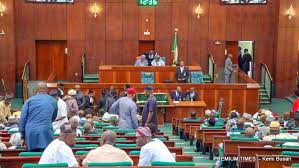The senate on Wednesday, threw its weight behind financial guidelines for local governments recently introduced by the Nigerian Financial Intelligence Unit (NFIU).
The Senate has also resolved that relevant stakeholders like state houses of assembly and the presidency should expedite action on the nagging issue of granting financial autonomy to local government councils across the country.
The Upper Chamber also urged all financial institutions to support the implementation of the new guidelines and the federal government to urgently fund the operations of the new NFIU. The Senate has also asked the 36 State and the Federal Capital Territory, FCT, to fully support the implementation of the new NFIU guidelines while calling on state assemblies to hasten constitutional amendment as regards local government autonomy.
The senate observed that such a measure would deepen democracy and good governance at the grassroots level. Resolutions of the Senate were sequel to a motion entitled, ” Nigerian Financial Intelligence Unit, NFIU and local government finances” sponsored by Senator Aliyu Sabi Abdullahi (APC, Niger North).
The motion drew the attention of Senate to new financial guidelines released by the Nigerian Financial Intelligence Unit (NFIU) and tagged “Guidelines to reduce vulnerabilities created by cash withdrawals from LG funds throughout Nigeria effective 1st June.” In his contribution, the dputy senate president, Ike Ekweremadu, and chairman of senate committee on constitution review urged the Senate to liaise with the NFIU to ensure that the guidelines do not contradict with any part of the Constitution.
Ekweremadu appealed to state assemblies to fast-track their work on pending constitutional amendments which would give legal backing to local government autonomy. His position was supported by Senator Adamu Aliero (Kebbi-APC), George Akume (Benue-APC) and deputy senate leader, Ibn Na’Allah.
It would be recalled that NFIU had on Monday issued a guideline which prevents state governments from making withdrawals from local governments’ funds. The new guideline mandates financial institutions to distribute funds accruable to local governments among the local government councils of that state and not for the other purposes, just as new financial guidelines limit cash transactions in the accounts of local governments to a daily maximum of N500, 000.
The statement had read that, ” with effect from June 1, any bank that allows any transaction from any local government account without monies first reaching a particular local government account will be sanctioned 100 per cent, locally and internationally. “In addition, a provision is also made to the effect that there shall be no cash withdrawal from any local government account for a cumulative amount exceeding N500,000 per day.”
Presenting the motion, Senator Sabi Abdullahi who noted that the issuance of the new guidelines was prompted by threats by international financial watchdogs to sanction Nigeria because of financial abuse, said that the NFIU guidelines would reinforce the existence of local government as an independent government established by the constitution at the grassroots level with sovereign and elected officials.
He said, “The Senate further agrees that the NFlU guidelines do not serve any purpose other than freeing the Financial System from being flooded with cash which criminals use to escape transparency, accountability, and criminal investigation.” In his contribution, former Plateau State governor, Senator Jonah Jang, who faulted the motion, said: “In some states, the state government takes over the local government funds and abuse it. We have also witnessed local government chairmen signing checks at the beer parlours.
Also contributing to the debate, Deputy majority leader, Senator Bala Ibn Na’allah, said: “If we succeed in executing this, 60 per cent of corruption in Nigeria will be resolved. This will be a major landmark if the Senate decides to follow through its resolutions. Let all financial institutions agree, and all of us agree that we must follow these guidelines and let the local governments be autonomous.”









